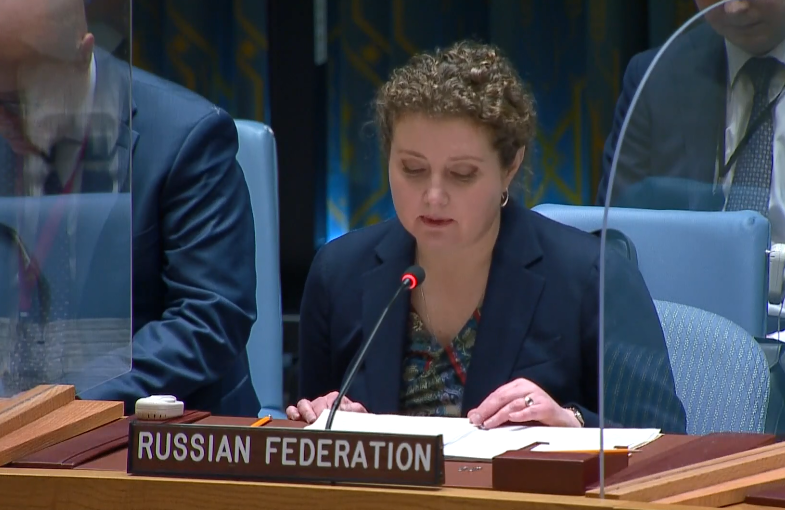Statement by Deputy Permanent Representative Anna Evstigneeva at UNSC briefing on the situation in Sudan
Mme.President,
We thank Special Representative Volker Perthes for a briefing on the developments in Sudan. We also welcome Sudan’s Charge d’Affaires a.i. to this meeting. Also, we have perused Secretary-General’s recent quarterly report on Sudan.
The situation in Sudan remains complicated. The political crisis does not abate. Humanitarian and socio-economic issues pose acute challenges. Almost full stop of donor assistance exacerbates the situation.
We note intense efforts that Sudanese authorities make in order to stabilize the situation and have constructive national dialogue both in the center and at the periphery of the country. We welcome the establishment in January of a committee to engage with Sudanese stakeholders on a way forward and to identify potential candidates for the post of Prime Minister, as well as extension of a nation-wide ceasefire regime. We positively perceive Sudan’s proclaimed intentions (confirmed by the military) to convene general elections in July 2023, as well as the commitment to the Juba Peace Agreement of 3 October 2020.
We commend engagement of the African Union and IGAD in Sudanese political settlement and the adopted decision to create together with the United Nations a joint coordination mechanism to support internal Sudanese dialogue. We hope these decisions will yield fruit.
We reiterate our call on all Sudanese stakeholders to be guided by Sudan’s best national interests, act responsibly and keep from steps that might trigger another confrontation. We advocate for resolving the existing disputes through a dialogue.
Mme.President,
We cannot agree with a biased and politicized approach to the developments in Sudan that we see in Secretary-General’s latest report. Instead of accentuating tasks of the transitional period, and establishment of institutions that should i.a. prepare and organize general elections, the report is focused on important yet secondary issues. In the report, episodes related to human rights and the rule of law come to the forefront, and focus on gender issues seems overpronounced. Such functions as support and mobilization of assistance for UNITAMS are substituted with control and monitoring. This does not meet the spirit of UN interaction with host authorities. We agree with concerns regarding the methods and assessments contained in the report, expressed in Sudan’s letter to the Security Council of 22 March 2022.
We call on the special political mission in Sudan and SRSG Perthes to stick to their mandate and pay equal attention to all its components. It is important to work towards achieving true concord of various political forces, as well as public, regional, ethnic and tribal associations. At the same time, direct tasks stipulated in UNSC resolutions must not be neglected – among them mobilization of international help and assistance to Sudan and support for implementation of the Juba Peace Agreement.
Mme.President,
Russia strongly opposes any measures of political pressure and outspoken economic blackmail that are still being applied to Sudan. We believe any external interference in Sudan's internal affairs is counterproductive and therefore unacceptable. We are convinced that the people of Sudan is capable of solving its internal problems. Imposing dubious socio-economic scenarios and universal “democratizer” gauges on the Sudanese leadership, as well as politicizing of issues related to economic and financial assistance have already created a division in the Sudanese society and made people lose trust in transitional authorities. This provoked overall instability and spiraled up centrifugal trends in the country.
Mme.President,
We have taken note of some statements by UNSC members, and statements by Western states in Sudanese media of 21 March that blamed Russia for global economic instability and price hike (especially for energy commodities and food), i.a. in Sudan. Please make no mistake: it is not Russian special military operation in Ukraine that provokes a possible food crisis, but illegal unilateral sanctions imposed by the West, that severed logistical and financial chains, fully disconnected Russia (manufacturer of food and fertilizers) from SWIFT, and threaten with mass arrests of dry-cargo vessels. Restrictions even affected our interaction with UN humanitarian agencies. We do not understand who can be tricked by such statements of yours – surely not the Sudanese who have experienced unilateral restrictions and even now are blackmailed over economic assistance. We call on the states that are having economic difficulties, many of which are created artificially, to not succumb to anti-Russian narrative, but rather consider this situation through the lens of their vital interests.
Mme.President,
In conclusion, we have taken note of the report of Chair of UNSC 1591 Committee, Ambassador Agyeman of Ghana, on the work of this subsidiary UNSC body over the past 90 days. We remain of the opinion that restrictive measures imposed on Sudan 15 years ago in view of the situation in Darfur fulfilled their task.
We remind that UNSC resolution 2620 of 15 February 2022 ruled to elaborate clear and realistic benchmarks until 31 August this year for readdressing Sudanese sanctions imposed in connection with the situation in Darfur. This term must be strictly observed. Attempts to postpone it only confirm the willingness of certain states to preserve international sanctions as a tool to execute pressure on Khartoum.
Thank you.
